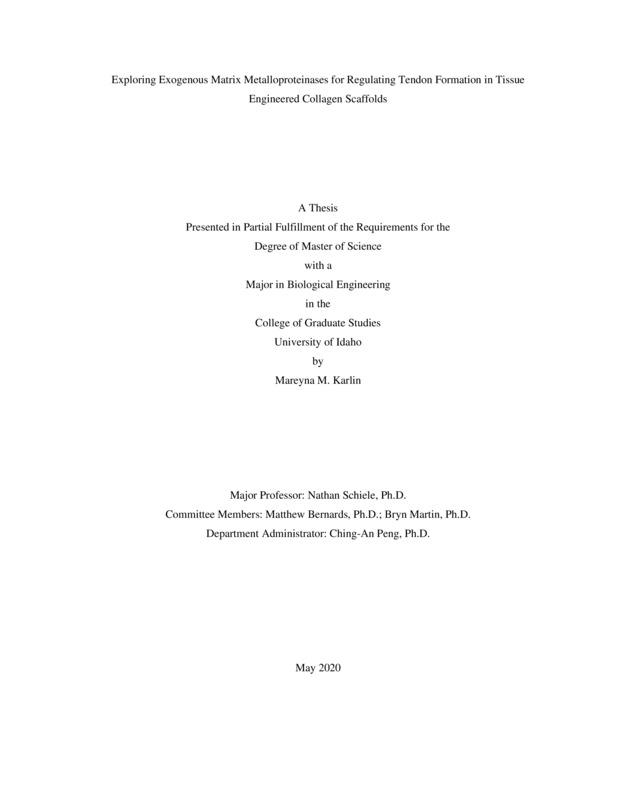Exploring Exogenous Matrix Metalloproteinases for Regulating Tendon Formation in Tissue Engineered Collagen Scaffolds
Karlin, Mareyna Melee. (2020-05). Exploring Exogenous Matrix Metalloproteinases for Regulating Tendon Formation in Tissue Engineered Collagen Scaffolds. Theses and Dissertations Collection, University of Idaho Library Digital Collections. https://www.lib.uidaho.edu/digital/etd/items/karlin_idaho_0089n_11848.html
- Title:
- Exploring Exogenous Matrix Metalloproteinases for Regulating Tendon Formation in Tissue Engineered Collagen Scaffolds
- Author:
- Karlin, Mareyna Melee
- Date:
- 2020-05
- Embargo Remove Date:
- 2021-09-03
- Keywords:
- Regenerative Medicine Tendon Tissue Engineering
- Program:
- Biological & Agricultural Engineering
- Subject Category:
- Biomedical engineering
- Abstract:
-
Tendon is one of the most commonly injured musculoskeletal tissues. Developing methods for regenerating tendon tissue will be crucial for the future treatment of tendon injuries. Tissue engineering strategies have explored combining cells, scaffolds, and signals for guiding tissue formation. Potential signals include biochemical and mechanical factors, but there is a need to identify appropriate combination of signals that regulate tendon formation. Recently, the enzymes that degrade matrix proteins, matrix metalloproteinases (MMPs), have been found in developing tendons. However, their use in engineered tendon formation has been limited. Therefore, our overall objective was to explore the combination of exogenous MMPs and mechanical strain to understand their roles in regulating engineered tendon tissue formation in vitro. In the following chapters we examine how mesenchymal stem cells (MSCs) and collagen type I scaffolds were impacted by MMPs and mechanical stimulus. We tested our central hypothesis that the alignment of the collagen fibers in the scaffolds would be improved with the combination of MMPs and tensile strain. In Chapter 2, treatments with exogenous pro-form MMP-1, 2, 8, and 13 were used to determine impacts on collagen scaffolds and MSCs. In Chapter 3, collagen scaffolds and tenogenically induced MSCs were treated with exogenous active MMP-1, 2, 8, and 13. In Chapter 4, exogenous active MMP-1, 2, 8, and 13 treatments in combination with a tensile strain were explored. The results of these studies showed that MMPs do not negatively impact MSC growth and viability. Furthermore, exogenous MMP treatments alone did not show any significant trends in collagen alignment, but the addition of a tensile strain in combination with active MMPs indicated that some localized collagen alignment occurred. This work provides important preliminary data for future tissue engineering studies and suggests that MMPs, mechanical loading, and their combinations may have promise for improving engineered tendon formation.
- Description:
- masters, M.S., Biological & Agricultural Engineering -- University of Idaho - College of Graduate Studies, 2020-05
- Major Professor:
- Schiele, Nate R
- Committee:
- Martin, Bryn; Bernards, Matthew
- Defense Date:
- 2020-05
- Identifier:
- Karlin_idaho_0089N_11848
- Type:
- Text
- Format Original:
- Format:
- application/pdf
- Rights:
- In Copyright - Educational Use Permitted. For more information, please contact University of Idaho Library Special Collections and Archives Department at libspec@uidaho.edu.
- Standardized Rights:
- http://rightsstatements.org/vocab/InC-EDU/1.0/

